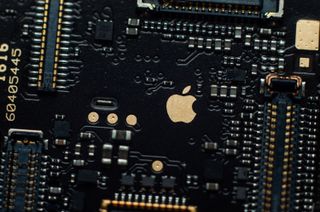
Amidst the global chip shortage caused by the Covid-19 pandemic, it seems that Apple has managed to float above it all — at least when it comes to the iPhone 13.
That's according to Wave7 Research, via PC Gamer, that says literally every manufacturer except Apple is being affected by the chipset shortage. This explains why Apple has been able to maintain such aggressive manufacturing targets for the iPhone 13, which not only will see increased production over the iPhone 12 by 20%, but is being met with 44% increased demand in the U.S. by current iPhone owners.
- New iPhone 13 rumor teases biggest changes versus iPhone 12
- iPhone 13 release date may have just leaked
- Plus: Would you buy a dual-screen MacBook that ditches the physical keyboard?
"Sources have told Wave7 Research that Apple was able to lock down chipset supply well ahead of time. This was not the case for other OEMs," said Jeff Moore, principal at Wave7, which tallies monthly survey sof U.S. smartphone share and pricing.
Interestingly, AT&T is being least affected by the chip shortage as it has the greatest volume of iPhone customers. T-Mobile, on the other hand, has been having trouble keeping stock of Samsung and OnePlus devices. A T-Mobile store manager told Wave7 that "everybody but Apple" is being affected.
This could maybe explain the muted sales of the Samsung Galaxy S21, which has reportedly seen a 47% decrease over the Galaxy S10 series. Wave7's report finds that S21 sales have been good, while mid-range Galaxy devices, like the A02, A01, A21 and A51, are being most affected. According to a Wave7 source, Samsung is prioritizing flagship device production over its A-series. This could be welcome information for the hundreds of thousands that pre-ordered the upcoming Galaxy Z Fold 3 and Galaxy Z Flip 3, both of which are breaking records for Samsung.
"iPhone share overall did not fall in July, as might be expected ahead of a September iPhone launch," Wave7 said in its report. "Ongoing iPhone 12 resilience and issues with Samsung inventory were the top factors for this."
It's not entirely a rosy picture for Apple heading into the fall phone launch season. When it forecast the current quarter last month, Apple warned of potential supply constraints affecting the iPhone and iPad. That likely means older parts used to make mobile devices and not newer components like the A15 Bionic chipset widely expected to power the latest generation of smartphones.
Sign up to get the BEST of Tom’s Guide direct to your inbox.
Upgrade your life with a daily dose of the biggest tech news, lifestyle hacks and our curated analysis. Be the first to know about cutting-edge gadgets and the hottest deals.
During that same call, Apple gave no indication that the iPhone 13 launch was in danger of delay; that wasn't the case a year ago when Apple told investors that the iPhone 12 wouldn't debut in the September quarter. Indeed, Apple staggered last year's phone rollout, with the iPhone 12 and iPhone 12 Pro arriving in October, and the iPhone 12 mini and iPhone 12 Pro Max models showing up in November.
The Wave7 report adds more evidence to suggest that Apple will be back to a September launch window for the iPhone 13. We'll soon learn exactly when Apple plans to release its new phone — and how much supply it will have on hand.
Imad is currently Senior Google and Internet Culture reporter for CNET, but until recently was News Editor at Tom's Guide. Hailing from Texas, Imad started his journalism career in 2013 and has amassed bylines with the New York Times, the Washington Post, ESPN, Wired and Men's Health Magazine, among others. Outside of work, you can find him sitting blankly in front of a Word document trying desperately to write the first pages of a new book.

